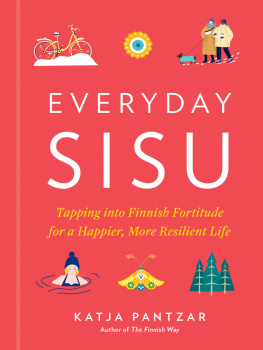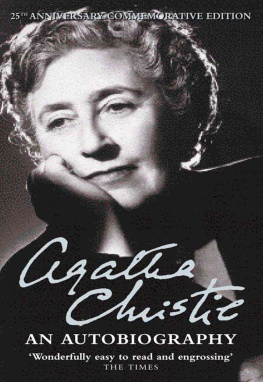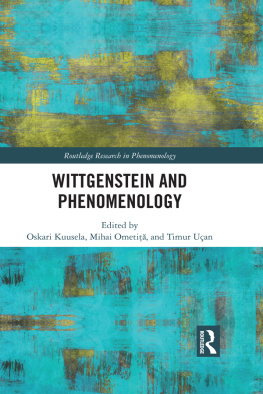
This edition is published by BORODINO BOOKS www.pp-publishing.com
To join our mailing list for new titles or for issues with our books borodinobooks@gmail.com
Or on Facebook
Text originally published in 1957 under the same title.
Borodino Books 2018, all rights reserved. No part of this publication may be reproduced, stored in a retrieval system or transmitted by any means, electrical, mechanical or otherwise without the written permission of the copyright holder.
Publishers Note
Although in most cases we have retained the Authors original spelling and grammar to authentically reproduce the work of the Author and the original intent of such material, some additional notes and clarifications have been added for the modern readers benefit.
We have also made every effort to include all maps and illustrations of the original edition the limitations of formatting do not allow of including larger maps, we will upload as many of these maps as possible.
SISU
EVEN THROUGH A STONE WALL
THE AUTOBIOGRAPHY OF
OSKARI TOKOI
Introduction by
John I. Kolehmainen, PhD.
With 21 Illustrations
TABLE OF CONTENTS
Contents
TABLE OF CONTENTS
LIST OF ILLUSTRATIONS
Oskari Tokoi, Premier of Finland Frontispiece
Union Pacific railyard, Rock Springs, Wyoming
Union Pacific railyard, Hannassa, Wyoming
Oskari Tokoi, Member of the First Finnish Diet
Speaker of the Diet Pehr Evind Svinhufvud and Governor General of Finland Nikolai Gerard open the First Diet of Finland, 1907
Social Democratic Party Congress, September 8-12, 1909
Revolution, 1917
Counter-Revolution, 1918
Edvard Gylling and Nikolai Lenin
Signers, with the author, Leon Trotsky, and Joseph Stalin, of the Treaty acknowledging Finnish independence
Petrograd Naval Revolutionary Committee, 1918
Lenin addressing crowd in Moscow, 1919
Karl Marxs grave, which was visited by the author when in England
Oskari Tokoi, lumberjack in Canada
The coast of Oregon
Mr. and Mrs. Tokoi on fundraising tour for Finnish relief
Mr. and Mrs. Tokoi being greeted by Emil Skog, Finnish Minister of Defense, and Alex Aaltonen, former Secretary of the Finnish Social Democratic Party, on their visit to Finland in 1949
On the 1949 trip Mr. and Mrs. Tokoi being welcomed by Prime Minister K. A. Fagerholm
Mr. and Mrs. Tokoi, guests of honor of the Finnish Diet
Waino Aaltonen, noted Finnish sculptor, working on bust of the author
Waino Aaltonen presenting bust of author to the Finnish Social Democratic Party, received by Vrikko Puskala, Secretary of the Party, and Emil Skog, Minister of Defense
INTRODUCTION
WHILE NOT MANY words of Finnish origin are ever likely to find their way into Websters dictionary, there are at the moment two possible contenders for the honor: sauna and sisu .
The first is readily identified as the inimitable Finnish steambath which, according to an enthusiastic American convert, limbers up the joints wonderfully, and sends a man home whistling tunes as loudly as a locomotive, for he feels good.
Sisu , on the other hand, has been more difficult to define precisely and adequately. A new Finnish-English dictionary offers a bewildering assortment of synonyms ranging in emphasis from pluck to intestinal fortitude and guts. Finlands famous composer Jean Sibelius once likened sisu to a metaphysical shot in the arm, which makes a man do the impossible. Such American friends of the gallant little republic as Hudson Strode and David Hinshaw have proposed that the mystifying four letter word be translated as something that surpasses fearlessness and extraordinary endurance...a kind of inner fire or superhuman nerve force....courage, tenacity, stubborn determination, energy and a will and an ability to get things done.
It may well be that the lives of men and women who have triumphed over well-nigh insuperable odds will yield a fuller and richer insight into the meaning of sisu than a dictionary. Perhaps sisu is lived, not defined.
Oskari Tokoi, in my judgment, is a member of this select company, and Im pleased to see sisu on the title page of this English-language edition of his memoirs.
I cannot honestly say that the word sisu flashed unforgettably across my mind when I first met Tokoi many years ago. Perhaps the lovely and gentle springtime of New England had something to do with this. The surroundings in which we met and talked failed somehow to suggest the heroic. My attentiveness was diverted by the murmur of the tiny brook that bisected the Tokoi lawn. Or was it the chirping of birds as they rejoiced in the return of bright green foliage?
Nor did my hosts appearance bring to mind any legendary Hercules. He was, I well remember, rather short and stockily built. His voice was unusually soft; he was slow to speak, and his words were deliberate, carefully chosen. His facial features were disarming; although he was serious most of the time an occasional smile brought a pair of dimples to his cheeks and a gleam to his dark eyes. His manner surely did not give a hint of daring or aggressiveness. Rather I was reminded of portions of Topelius classic description of the Finnish character: a slow contemplative way of thinking...taciturn reticency...a distant, reserved attitude.
It was almost impossible for me to cast this unassuming and unobtrusive person in the roles of a bold adventurer, a stubborn fighter for human rights, an able leader of men, a skilful politician, a trustworthy statesman, a courageous journalist, and a persuasive speaker. Yet he was all these, and I was compelled again to realize that external appearances were deceptive, and that deeds were the only true measurement of a mans character and stature.
The record is now before us, and it constitutes, in my opinion, an inspiring revelation of Finnish sisu . It took real bravery for a young country lad of eighteen to emigrate to the New World in 1891 and to toil long hours in the eerie half-darkness of Wyoming and Colorado mines, disdainful of the large chunks of rock and ore hanging overhead which seemed to warn: Beware! Someday well fall and bury you!
Tokoi returned to Finland in 1900, a five pound money belt around his waist secreting eighty twenty-dollar gold pieces, the fruit of nine years of Spartan frugality. Yet no life of comfort and ease awaited him in the Old Country. For one thing, powerful pan-Slav conspirators, headed by the notorious Governor-General Bobrikov, were determined to crush Finnish liberties. The Yankee, freshly imbued with the free spirit of the New World, quickly found his place in the vanguard of the resistance movement.
There was also a domestic enemy, social injustice, which caught the attention of the returned emigrant, whose sensitivity to the welfare of the common man had been heightened by his eye-opening experiences in America. He eagerly entered the Social Democratic and trade union movements, where his ability, integrity, energy, and wholehearted devotion, won for him ever-widening respect and recognition. He was elected to the diet (1907-1917), the chairmanship of the Trade Union Organization (1912), the speakership of the diet (1913), and finally to the premiership (1917).












